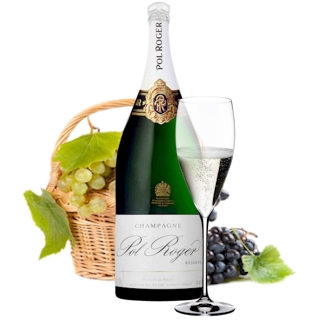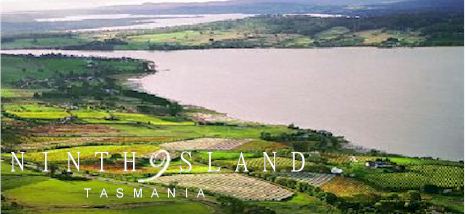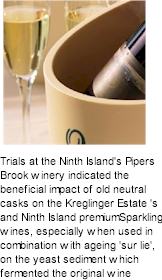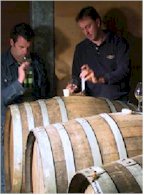


Ninth Island, which is part of the Kreglinger group of wineries, acquired the immensely successful D Block Vineyard in 1993. Being located on the banks of the Tamar River this site does not have the frost risk of Tasmanian other vineyards. The view here is fantastic, and being a comparatively warm site, it is dedicated to table wine production, the backbone for Ninth Island's Pinot Noir, Chardonnay and Sauvignon Blanc range. It is also the source of Pipers Brook Pinot Gris, Gewürztraminer and Tamar Estate (Cab/Merlot) wines. It is also the only site that is able to adequately ripen fruit if the vines are managed correctly to produce the Pipers Brook Tamar Estate Cab Merlot

The E Block vineyard is a small 6Ha adjunct to Ninth Island Vineyard (D blocks) and was planted in 1995 to Pinot Noir, Sauvignon Blanc, Merlot, Riesling and Chardonnay. This vineyard is irrigated from time to time and is generally managed using a combination of mechanical and manual inputs. The north facing aspect of this vineyard provides ideal growing and ripening conditions for the lush vines.
Don Buchannan developed the small Ninth Island H Block vineyard in the Tamar Valley in the late 1980s. The vineyard plays a significat role in the Ninth Island wines, particularly the Pinot Noir, Chardonnay and Sauvignon Blanc. This vineyard operates principally under a mechanised management strategy with the use of machines for vine management where possible. Dolerite soils require seasonal irrigation and fertilisers for maintaining vine health and fruit quality.
The B Block vineyard is susceptible to spring and autumn frosts. These frost conditions are managed with the use of three frost fans and sprinkler frost control systems. Planted under a high-density regime, it is non irrigated and located on deep red Kroznozem soils, ideally suited to the production of the Ninth Island Sparklings. Ninth Island have engineered an ongoing vine grafting program into this vineyard to extract lavish Pinot Grigio fruit.

The Ninth Island's G block property is the largest of the Pipers Brook Vineyard group. Totalling approx 56 Ha it was planted over three years from 1997 - 1999. It is planted primarily to pinot noir with some significant areas of chardonnay, pinot gris and a little pinot meniure. The soils generally consist of a medium clay loam through to a deeper Red Kroznozem soil type through the centre of the property. The vineyard is managed for production of both sparkling and table wines.
Viticulture operations are generally mechanised with the use of machine harvesters, wire lifting machines, leaf pluckers etc. This sight is flat in comparison to other Pipers Brook Vineyard sites and requires the seasonal use of five frost fans in susceptible areas to prevent damage to the vines from low overnight air temperatures. This vineyard is an important component to the Ninth Island Pinot Noir, Ninth Island Pinot Grigios and Ninth Island Sparkling wines.
The VSP system shades the fruit resulting in less colour and higher malic acid levels, both positive factors for sparkling wine. The cool sites produce ripe grapes with enough acidity to allow the base wines to undergo a full malo. This results in a rich, subtle and sophisticated style.
Low yields base wines only have richness and mouthfeel if they are from vines that have not been overcropped, ideally between 6 - 12 tonnes per hectare. Close planted vineyards history has shown that close planted vines do compete for soil moisture and begin their grape ripening cycle earlier than vines under less competitive pressure. The early style objective employed by Ninth Island for selected wines is to make big, juicy wines with rich mouthfeel and a dry finish.
